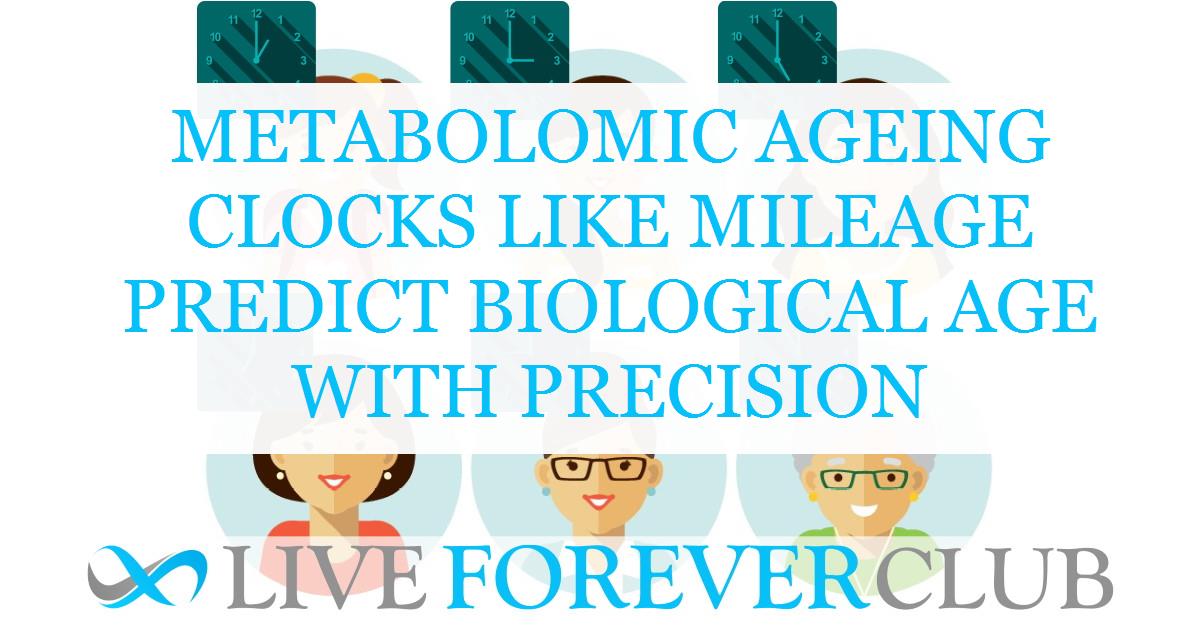Biological ageing is a complex process influenced by various molecular and cellular changes. While chronological age is a universal metric, it often fails to capture the nuances of individual health trajectories. A new study, "Metabolomic Age (MileAge) Predicts Health and Life Span: A Comparison of Multiple Machine Learning Algorithms," dives into this gap, proposing a metabolomic-based ageing clock that could revolutionize health assessments.
Understanding Metabolomic Ageing Clocks
The concept of biological ageing clocks stems from the need to measure ageing beyond years lived. Ageing clocks use molecular markers to estimate biological age, which can vary significantly among individuals of the same chronological age. This study specifically focuses on metabolomic clocks—tools that assess ageing by analysing metabolites, the small molecules generated during metabolism.
Metabolomics offers a comprehensive snapshot of an individual's physiological state, enabling predictions about health, disease risk, and longevity. The study utilised nuclear magnetic resonance (NMR) spectroscopy data from the UK Biobank to evaluate various machine learning algorithms and their ability to predict chronological age based on 168 plasma metabolites.
Key Findings of the Study
Performance of Machine Learning Models
The research assessed 17 machine learning algorithms, including linear regression, support vector machines (SVMs), and tree-based methods. The Cubist rule-based regression model emerged as the most effective in predicting biological age.
- Accuracy Metrics: The mean absolute error (MAE) ranged from 5.31 to 6.36 years across models, with the SVM-radial achieving the lowest error.
- Nonlinear Relationships: The study found that nonlinear models like Cubist captured the intricate relationships between metabolites and ageing better than linear models.
Health Associations
Individuals with an older metabolomic age than their chronological age were more likely to exhibit:
- Higher frailty index scores.
- Shorter telomere lengths.
- Increased risk of chronic illnesses.
- Poorer self-rated health.
The metabolomic age, termed MileAge, showed strong correlations with these health markers, making it a robust tool for identifying individuals at risk of accelerated ageing.
Mortality Predictions
MileAge demonstrated a significant association with all-cause mortality. For instance, a one-year increase in MileAge delta (the difference between metabolite-predicted and chronological age) corresponded to a 4% increase in mortality risk. Those with a MileAge delta greater than one standard deviation above the mean had a 52% higher mortality risk.
Why Metabolomics?
Unlike other biological markers like DNA methylation, metabolomics captures the dynamic interplay of genetic, environmental, and lifestyle factors. This integrative view offers unique insights into ageing processes.
- Metabolites Identified: Key metabolites like omega-3 fatty acids, albumin, and citrate emerged as strong predictors of biological age and health outcomes.
- Pathway Insights: The study highlighted lipid and amino acid pathways as critical components of ageing, aligning with prior research.
Implications for Health Assessments
Personalised Medicine
The ability to predict biological age and health risks through a single blood test could revolutionise personalised healthcare. Metabolomic clocks could guide interventions targeting modifiable ageing pathways.
Proactive Health Tracking
MileAge provides an intuitive, year-based metric for health monitoring, encouraging proactive engagement with lifestyle changes to slow biological ageing.
Clinical Trials
Ageing clocks could stratify participants in clinical trials, ensuring that interventions are tailored to biological rather than chronological age.
Methodological Insights
The study’s robustness lies in its comprehensive approach:
- Large Dataset: Over 225,000 participants from the UK Biobank provided a rich dataset.
- Cross-Validation: A nested cross-validation approach ensured reliable performance estimates.
- Bias Correction: Statistical corrections addressed the tendency of models to overestimate age in younger individuals and underestimate it in older ones.
Limitations and Future Directions
While the findings are promising, several limitations warrant attention:
- Generalisability: The dataset was primarily derived from UK Biobank participants, necessitating validation in more diverse populations.
- Longitudinal Data: Cross-sectional data limits the ability to capture ageing trajectories. Future research should incorporate longitudinal datasets.
- Expanded Metabolite Coverage: Current metabolomic platforms focus heavily on lipids and amino acids. Broader metabolite coverage could enhance model accuracy.
Comparing to Other Ageing Clocks
MileAge outperformed other metabolomic clocks like MetaboAge 2.0 but was slightly less predictive than MetaboHealth, a mortality-specific metabolomic profile. Compared to widely used epigenetic clocks like GrimAge, metabolomic clocks offer a complementary perspective, emphasising physiological rather than molecular ageing.
The Road Ahead
The integration of metabolomic ageing clocks into healthcare systems could have profound implications. As technologies like NMR spectroscopy become more accessible, routine health assessments could include biological age metrics. Additionally, the focus on modifiable factors opens avenues for interventions targeting the root causes of accelerated ageing.
In conclusion, metabolomic ageing clocks represent a leap forward in understanding and measuring biological ageing. By leveraging machine learning and large-scale metabolomic data, MileAge provides a powerful tool for predicting health, longevity, and disease risk. As research continues to refine these models, their potential to transform healthcare becomes increasingly evident. Proactive, personalized, and precise—the future of ageing research is here.
The study is published in the journal Science Advances. It was led by Julian Mutz from King’s College London.






